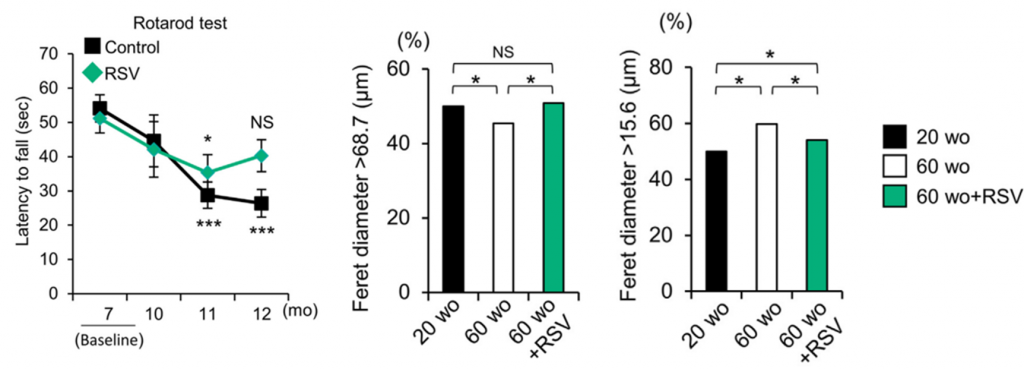Key Points:
- Resveratrol supplementation ameliorates motor dysfunction, skeletal muscle atrophy, and cardiac hypertrophy (heart enlargement) in aged mice.
- The process of clearing cellular waste (autophagy) is reduced in the heart and skeletal muscles of aged mice, but treatment with resveratrol restores autophagy.
- Inhibiting the activity of SIRT1 – a key protein for genomic stability and DNA repair – blunts autophagy in the heart and muscle and increases muscle atrophy.
Cardiac muscle hypertrophy (heart enlargement) and the loss of skeletal muscle mass and function (sarcopenia) are two prevalent age-related diseases with strong ties to impaired autophagy – the removal of cellular waste. Researchers have pinpointed SIRT1 as a promising target to enhance autophagy, and it turns out that resveratrol – a natural polyphenol found in berries, nuts, and some plants – activates SIRT1, highlighting its potential to mitigate these two harmful conditions.
In a new study reported in the Journal of Pharmacological Sciences, researchers from Sapporo Medical University in Japan explored the protective effects of resveratrol on muscle and heart aging in naturally aged mice. Kuno and colleagues showed that treating naturally aged mice with resveratrol preserved motor function and attenuated both muscle atrophy and cardiac hypertrophy. Additionally, resveratrol supplementation restored autophagy in both cardiac and muscle tissue. However, blocking SIRT1 activity impaired autophagy and induced muscle atrophy, demonstrating the dynamic relationship between resveratrol, SIRT1, and autophagy.
Resveratrol Delays Muscle and Heart Aging
Resveratrol continues to establish itself as a promising anti-aging intervention, holding strong antioxidative and anti-inflammatory properties. And although studies have elucidated resveratrol’s protective effects in models of muscular dystrophy – a genetic disorder that accelerates muscle deterioration – and hypertension (high blood pressure), little data exists surrounding resveratrol’s effects on the heart and muscle during natural aging.
To shed light on this matter, Kuno and colleagues supplemented 28-week-old mice with resveratrol for 32 weeks and monitored structural and functional changes in muscle tissue and the heart. The investigators showed that 60-week-old mice treated with resveratrol displayed superior coordination and significantly less muscle atrophy than their untreated counterparts, indicating that resveratrol preserves muscle structure and function during aging. Furthermore, resveratrol supplementation mitigated cardiac hypertrophy, demonstrating its potential to delay cardiac aging.

Resveratrol Stimulates Autophagy
Autophagy is vital to disposing of dysfunctional and toxic cellular material that builds up with age. However, aging slows down this critical process and leads to increases in oxidative stress, inflammation, and mitochondrial dysfunction, all of which hinder muscle and cardiac health. Scientists have identified SIRT1 as a promising autophagy activator, and since resveratrol stimulates SIRT1 activity, Kuno and colleagues were curious to see how resveratrol affected age-related changes in autophagy.
The investigators analyzed changes in autophagy by measuring the presence of autophagosomes – a spherical structure essential for material degradation. Compared to untreated 60-week-old mice, those treated with resveratrol contained significantly higher levels of autophagosomes in cardiac and muscle tissue. Notably, mice with impaired autophagy also displayed higher levels of acetylated proteins – a marker for reduced SIRT1 activity – in skeletal muscle tissue, suggesting that reduced SIRT1 activity impairs autophagy.

To further evaluate SIRT1’s role in autophagy and muscle health, the investigators genetically inhibited SIRT1 and monitored changes in autophagy and muscle structure. As expected, mice missing SIRT1 presented significantly less autophagy activity than naturally aged mice. What’s more, SIRT1-deficient mice exhibited even greater muscle atrophy than untreated aged mice, demonstrating that SIRT1 is vital to autophagy and muscle health.
Resveratrol: A Potential Therapeutic to Combat Hallmarks of Aging
Overall, the findings show that resveratrol delays cardiac and muscle aging by revitalizing autophagy, which requires sufficient SIRT1 activity. Resveratrol is perhaps one of the most well-rounded anti-aging compounds to date, with studies confirming its ability to boost memory in Alzheimer’s models and reduce disease-promoting senescent (aged) cells. Notably, combining resveratrol with other potent SIRT1 activators like nicotinamide mononucleotide NMN) has already been shown to increase NAD+ in the heart and muscle by 1.59-fold and 1.72-fold. Given NAD+’s major role in energy production, metabolism, and genomic stability, there’s a chance that combining resveratrol with NMN can target multiple hallmarks of aging.